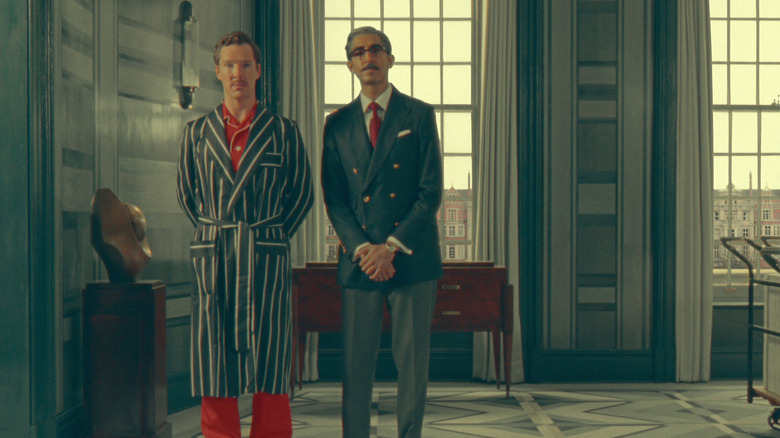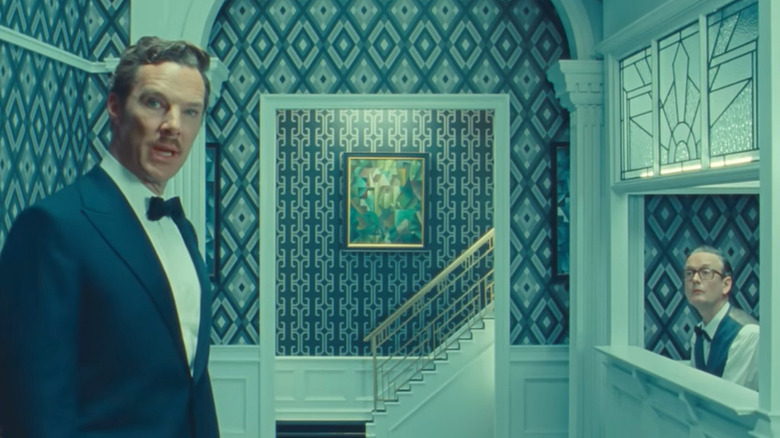Wes Anderson Officially Has His Best Chance Yet At Winning An Oscar
The Academy of Motion Picture Arts and Science's membership has always viewed Wes Anderson with wary respect. Beginning with 2001's "The Royal Tenenbaums," the idiosyncratic filmmaker has been nominated for eight Oscars, but aside from "The Grand Budapest Hotel" (which received nine nominations and won four for Makeup and Hairstyling, Costume Design, Production Design, and Original Score), the majority of voters seem puzzled by his movies. Some people outright hate them and trust me when I say that they cannot be swayed.
And if a film as warm and brilliantly constructed as last year's "Asteroid City" can't even snag what would've been Anderson's fourth Best Original Screenplay nod, there's no reason to believe he'll ever win over enough voters to take home a competitive Oscar in any of the feature categories (unless he drops the artifice and makes a more straightforward comedy about eccentrics like "Terms of Endearment").
The shorts categories, however, are a different story.
As expected, Anderson earned a Best Short Film (Live Action) nomination for his adaptation of Roald Dahl's short story "The Wonderful Story of Henry Sugar." The movie is one of four Dahl shorts Anderson made for Netflix, and the streamer has been lobbying hard for it since its splashy premiere at the 2023 Venice International Film Festival. Though there's a possibility the category's rules might work against Anderson, I think they're much more likely to benefit him.
Pure, uncut (and brief) Wes
"The Wonderful Story of Henry Sugar" is easily the most formally adventurous work of Anderson's career. Unbound by the commercial expectations of a wide-ish theatrical release, the filmmaker imbues the tale of a gambler (Benedict Cumberbatch) who develops the power to see without his eyes with a stylish verve that makes his previous work look almost pat. The major upside to this ability is that he can now see the flipside of every card dealt during a game of blackjack. When Henry grows bored of accumulating massive wealth through dishonest means, he begins putting his fortune toward charitable causes.
It's a fairly straightforward fantasy, but Anderson tells it with tremendous wit and brio — and, most importantly, he does it in just under 40 minutes (the Academy's runtime requirement for this category).
Though Anderson has never made a movie that runs over two hours, his quirky aesthetic wears some viewers down fairly rapidly. I disagree strongly with such people (to put it kindly), but this tighter format might get them in and out of an Anderson movie before they cry uncle. They might — gasp! — actually dig what he's throwing down for once (and he throws a lot at us in this one).
But if they still can't get with Anderson, there's another factor working in his favor.
Love him or tolerate him, you've got to admit that Wes is due
Academy rules stipulate that members must view all five nominees in order to vote in this category. This doesn't sound like work, and it really isn't, but some folks don't take their responsibilities as Academy members seriously and, thus, skip out on the category. These also tend to be people with less sophisticated palates — i.e., people who detest audacious stylists.
And there's always the conventional Academy wisdom that a frequently nominated artist is due for a trophy. This is how actors and filmmakers wind up winning Oscars for work that is clearly not their best. In this case, I think Anderson would be winning for possibly his most exhilarating movie to date, so a win would be satisfying and encouraging. I want to see Anderson get this weird every now and then.
Everything appears to be working in his favor for once. The sentiment is there. The Academy might've screwed him on "Asteroid City," but this would make up for 20-plus years of snubs. It's his time.


